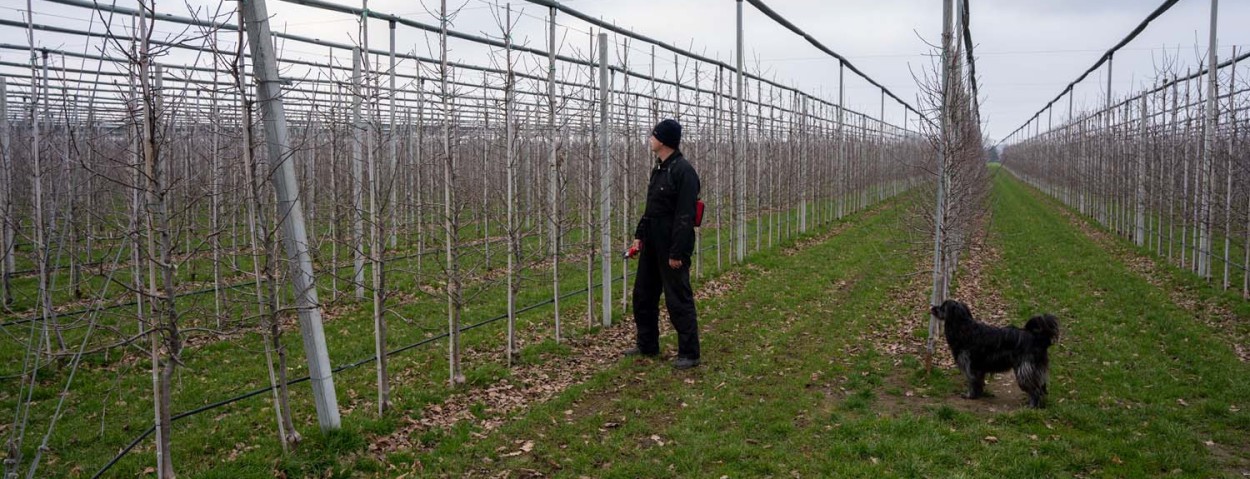Do club varieties offer a way out for fruit growers?

Source: Vilt.be. VILT is the Flemish infocentre of agriculture and horticulture.
The mood of depression within the fruit industry is great, due in part to the war in Ukraine causing oversupply and a lack of fair prices, for which growers demonstrated just last month at retail federation Comeos in Brussels. At the same time, experts point to the potential of club varieties. With these varieties, the licensee has control over volume and oversupply can be prevented. Due to distinctive qualities, such as taste, shelf life and marketing, club varieties are also interesting for retail. But Flemish growers are rather reacting in a wait-and-see manner for fear of losing their freedom.
Fruit growers' despondency lies mainly in the poor pricing of apples. The fruit has been bringing in little money for years, and last year reached its lowest point. Because of the war in Ukraine, Polish apples intended for the Russian market suddenly found their way to the European market and prices of 35 cents were paid, while the grower should receive at least 60 cents, says Xavier Laduron, Walloon apple grower and the face behind the fruit action group CepiFruit.
Cepifruit, together with the action group Fruittelers was an organizer of the protest in Brussels last month. Dozens of growers had gone to the Comeos trade federation with their tractors to demand better prices. In follow-up talks, Comeos brought in that the price of fruit is determined by an international (over)supply and a demand that keeps falling in Belgium. The fruit growers say they are still in talks with retailers, especially to give Belgian apples priority on store shelves, but do not rule out follow-up action.
Strong decrease in acreage is obvious
Fruit growers Albert-jan Markvoort and Gerty Wauters from Tienen see the ailing fruit market in Flanders with sorrow. In March, they are pruning his orchard, during which time they are assisted by a number of seasonal workers. Because of the mediocre pricing in recent years, the growers are skeptical about the future. "If it wasn't my passion, I would have quit already," says Markvoort, who explicitly stops his son from becoming a fruit grower. He predicts a sharp reduction in fruit acreage in Flanders if retail does not raise prices.
To stem the negative tide, growers started club varieties several years ago. Three years ago the club variety Bonita went into the ground and last year the first apples were harvested. The apple, which ends up on the shelves of Lidl, among others, is paid better, Wauters says. In addition, the apple variety is sold year-round at a stable price and retail demand is constant, she says. "So that's a good sign."
The new apple variety is a cross between Topaz and Cripps Pink. Markvoort and Wauters praise the apple's resistance to scab, among other things. This seems to guarantee the cultivation of the variety also in the future, when the use of plant protection products will be curtailed. "Moreover, the yield per hectare is decent and the apple can also be stored for a long time."
Club varieties in Belgium
Bonita is one of thirteen new (club) varieties grown in our country, according to statistics from Proefcentrum Fruitteelt. A club variety is a variety owned by the nurseryman/breeder. Someone interested in a particular variety can enter into a contract with the owner and then pay royalties per kilogram sold. The party with the exploitation rights then engages fruit growers and supermarkets for the new variety. In the case of Bonita, Appelselect handles the marketing, while Gerty Wauters maintains contacts with Bonita growers.
In other words, with a club variety, there is a closed chain concept and the licensee can set its own rules of the game. Among other things, one has control over the cultivated area and an oversupply, resulting in lower prices, can be prevented. Club varieties also have advantages for supermarkets because they are distinctive. Moreover, the licensees have a lot of control over the quality of the apples and money is also spent on marketing.
"It's ultimately a matter of waiting to see if a club variety catches on in the supermarket. It's a long haul" Gerty Wauters - Fruit grower from Tienen (BE)
Sophisticated marketing explains, among other things, the success of Kanzi, a Belgian breed of which BelOrta, among others, is the licensee. However, Kanzi is an exception and most club varieties do not enjoy nearly as much success. "It is ultimately a matter of waiting to see which club variety catches on in the supermarket and often a matter of the long haul. It's an investment," Wauters says.
A statistic from Proefcentrum Fruitteelt shows that despite the supposed potential, the introduction of club varieties in Belgium lags behind compared to other European countries. Across Europe, new varieties were grown 6.1 percent last year, with outliers at the national level in France (+18.5%), Italy (+14%) and the Netherlands (+13.7%). In Belgium, club varieties accounted for 4.5 percent of total production last year. "Belgian growers do not like to give up their freedom," explains Jef Vercammen of PC Fruit. Still, Vercammen also sees potential in club varieties to turn the tide in the sector somewhat. Theoretically, with a sophisticated marketing strategy, club varieties could also reverse the declining consumption of apples.
Source: Vilt.be. VILT is the Flemish infocentre of agriculture and horticulture founded in 1996 as a non-profit organization. The mission of the organization is as follows: By means of information and communication, VILT independently promotes and stimulates a better knowledge and understanding of Flemish agriculture and horticulture, in the broadest sense of the word.




.jpg)